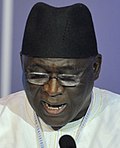Contents
- Incumbents
- Events
- January to March
- April to June
- July to August
- September to October
- Deaths
- See also
- References
| |||||
| Decades: | |||||
|---|---|---|---|---|---|
| See also: | |||||
Events in the year 2021 in Mali .
| |||||
| Decades: | |||||
|---|---|---|---|---|---|
| See also: | |||||
Events in the year 2021 in Mali .
Ongoing — COVID-19 pandemic in Mali and Mali War
